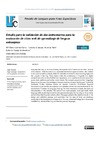Identificador persistente para citar o vincular este elemento:
https://accedacris.ulpgc.es/jspui/handle/10553/70411
| Título: | Estudio para la validación de dos instrumentos para la evaluación de sitios web de aprendizaje de lenguas extranjeras | Autores/as: | Gómez Parra, Maria Elena Aránzazu Huertas Abril, Cristina Espejo Mohedano, Roberto |
Clasificación UNESCO: | 570107 Lengua y literatura 550510 Filología |
Palabras clave: | Second language learning Digital competence Language competence Assessment of websites Validation of an instrument, et al. |
Fecha de publicación: | 2019 | Publicación seriada: | LFE. Revista de Lenguas para Fines Específicos | Resumen: | El aprendizaje de lenguas, tal y como hoy lo conocemos, ha experimentado un giro copernicano que, entre otros motivos, encuentra sus raíces en una revolución tecnológica sin precedentes, la creación de contextos comunicativos reales, la motivación y la necesidad del alumnado por conocer nuevas lenguas, y la ubicuidad del aprendizaje. Estos factores hacen que la unión de la competencia lingüística y la digital se haya convertido en un constructo cardinal del proceso de aprendizaje que los habilita para acceder a herramientas, plataformas y entornos online. El proyecto de investigación titulado “LinguApp: Asegurando el acceso al aprendizaje universal e inclusivo de segundas lenguas” (PRY208/17), financiado por la Fundación Pública Andaluza Centro de Estudios Andaluces (Consejería de la Presidencia, Administración Local y Memoria Democrática de la Junta de Andalucía), planificó el desarrollo y la validación de dos instrumentos destinados a la evaluación de sitios web de aprendizaje de lenguas extranjeras. El primero de ellos valora las características técnicas de los recursos, mientras que el segundo instrumento aborda de manera específica qué destrezas y cómo se desarrollan, atendiendo a los contenidos y a las actividades que ofrece el sitio web. Este trabajo presenta los resultados estadísticos de este proceso de diseño y validación, concluyendo que este tipo de herramientas puede contribuir decididamente al desarrollo de la investigación de esta área, donde la tecnología ha modificado sustancialmente el proceso de aprendizaje y enseñanza de segundas lenguas. Language learning, as we know it today, has experienced a Copernican turn that - among other reasons - finds its roots in an unprecedented technological revolution, the creation of real communicative contexts, students’ motivation and need to learn new languages, and the ubiquity of learning. These factors make the combination of linguistic and digital competences a key construct of the learning process, which enables learners to access new access tools, platforms and online environments. The research project entitled “LinguApp: Asegurando el acceso al aprendizaje universal e inclusivo de segundas lenguas”, funded by Fundación Pública Andaluza Centro de Estudios Andaluces (Andalusian Regional Government), planned the development and validation of two instruments devoted to the assessment of websites for language learning. The first instrument evaluates the technical characteristics of the websites. The second instrument assesses more specifically which language skills are developed and how this process takes place by focusing on the contents and activities that the given website offers. This paper presents the statistical results of the design and validation process, and concludes that this type of tools can decisively contribute to the development of research in this area, where technology has substantially modified the process of learning and teaching second languages. |
URI: | https://accedacris.ulpgc.es/handle/10553/70411 | ISSN: | 1133-1127 | DOI: | 10.20420/rlfe.2019.250 | Fuente: | LFE. Revista de lenguas para fines específicos [eISSN 2340-8561], v. 25 (1), p. 62-80 |
| Colección: | Artículos |
Citas de WEB OF SCIENCETM
Citations
1
actualizado el 22-feb-2026
Visitas
25
actualizado el 10-ene-2026
Descargas
44
actualizado el 10-ene-2026
Google ScholarTM
Verifica
Altmetric
Comparte
Exporta metadatos
Los elementos en ULPGC accedaCRIS están protegidos por derechos de autor con todos los derechos reservados, a menos que se indique lo contrario.
